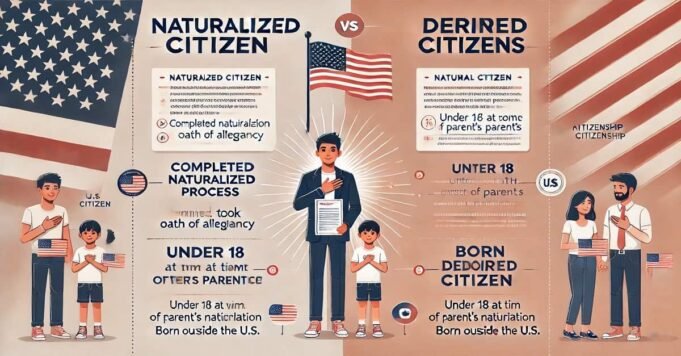What does the path to citizenship mean for your legal rights and benefits? Citizenship in the United States opens doors to numerous privileges, from voting rights to passport access. Yet, the way someone becomes a citizen can influence which benefits they receive and how certain legal processes apply. Two primary routes—naturalization and derivation—lead to U.S. citizenship, each with its distinct journey and implications. Understanding these differences isn’t just for those seeking citizenship; it matters for anyone curious about how these paths shape legal rights.
Defining Naturalized and Derived Citizenship
Before diving into how legal benefits differ, it’s important to grasp what naturalized and derived citizenship mean. A naturalized citizen is someone born outside the United States who voluntarily becomes a U.S. citizen through a formal application process. This usually involves meeting residency requirements, passing a civics and English test, and taking an oath of allegiance. In contrast, a derived citizen gains citizenship through their parents. If a child has at least one U.S. citizen parent—by birth or naturalization—and meets specific conditions (like age and residency), they may automatically acquire citizenship without applying independently. People often wonder, what is naturalized or derived citizen and where do the differences like? Essentially, the key difference lies in whether the person actively applied for citizenship or received it automatically through family connections.
Legal Benefits Shared by Both Citizens
No matter how someone obtains U.S. citizenship, many core legal rights remain the same. Naturalized and derived citizens both enjoy the full protection of the U.S. Constitution. This includes the right to vote in federal, state, and local elections, obtain a U.S. passport, and access federal jobs limited to citizens. Additionally, both groups are eligible for government benefits like Social Security and Medicare after meeting work and age requirements. Jury duty, while often seen as an obligation, is also a right shared by all citizens. These core privileges reinforce the principle that once someone becomes a citizen—through any legal path—they are fully integrated into the nation’s civic fabric.
Key Differences in Legal Benefits
While naturalized and derived citizens share most rights, there are a few differences worth noting. These variations typically arise from how each person acquired citizenship and the documentation they hold.
1. Documentation and Proof of Citizenship
Naturalized citizens receive a Certificate of Naturalization after completing the process, serving as primary proof of citizenship. Derived citizens, however, might need to apply for a Certificate of Citizenship to have official documentation. Although derived citizenship is automatic, the absence of formal paperwork can create challenges when applying for a passport or government benefits.
2. Impact on Family-Based Immigration
Naturalized citizens can petition for a wider range of family members to immigrate, including siblings and married children. Derived citizens enjoy these same privileges but may face confusion if they lack clear documentation proving their citizenship status. Having the right paperwork in place ensures smoother immigration processes for family members.
3. Citizenship Revocation Concerns
While rare, the U.S. government can revoke naturalized citizenship if it was obtained through fraud or misinformation. Derived citizens generally face less risk in this area, as their citizenship is automatic through a parent. However, accurate records are crucial for both groups to avoid legal complications.
Why Documentation Matters—Even for Derived Citizens
For derived citizens, the automatic nature of citizenship can sometimes lead to complacency about official documentation. But having clear, legal proof is essential. Without a Certificate of Citizenship, challenges may arise when applying for a passport, enrolling in certain federal programs, or proving eligibility for government services. Derived citizens who rely solely on their parents’ naturalization papers or birth records may encounter delays or rejections. Securing the proper documents early on helps prevent these issues and ensures full access to all citizenship benefits.
The Citizenship Process: Personal Effort vs. Family Connection
Naturalized citizenship reflects a personal journey—filled with applications, interviews, and an oath of allegiance—highlighting an individual’s active choice to embrace U.S. citizenship. Derived citizenship, on the other hand, represents a family connection. While both lead to the same legal standing, the experiences differ significantly. Naturalized citizens often have a deeper awareness of the process, given the personal effort involved. Derived citizens, especially those who became citizens at a young age, may not fully realize their status until needing to prove it later in life. Understanding these distinctions can help individuals appreciate the value and responsibilities tied to their citizenship.
Which Path Is “Better”?
It’s not about which route is better—it’s about how each path shapes one’s experience. Naturalization emphasizes personal agency, while derivation highlights familial ties. Both paths grant equal legal standing but come with unique considerations. Naturalized citizens often feel a strong sense of accomplishment after navigating a challenging process. Derived citizens benefit from a streamlined path but may need to be more proactive in securing official documentation. Recognizing these nuances helps individuals make informed decisions, especially when planning for family immigration or accessing government services.
Navigating Your Citizenship Rights
Understanding how naturalized and derived citizenship differs isn’t just a legal exercise—it’s about ensuring you fully enjoy the rights and benefits you’re entitled to. Whether you became a citizen through personal effort or family connection, knowing what documentation you need and how your path influences certain legal processes can save time and prevent frustration. If you or your family members fall under derived citizenship, double-check that you have the proper certificates. Naturalized citizens should keep their naturalization documents in a safe place and consider how their citizenship status can benefit family members seeking U.S. residency.
Taking Charge of Your Citizenship
Citizenship isn’t just a status—it’s a gateway to participation, protection, and opportunity. No matter how you became a U.S. citizen, embracing that role means understanding your rights, maintaining proper documentation, and staying informed about the benefits available to you. Whether your path was through naturalization or derivation, your citizenship holds the same value. Stay proactive, stay informed, and make the most of the opportunities citizenship provides.















